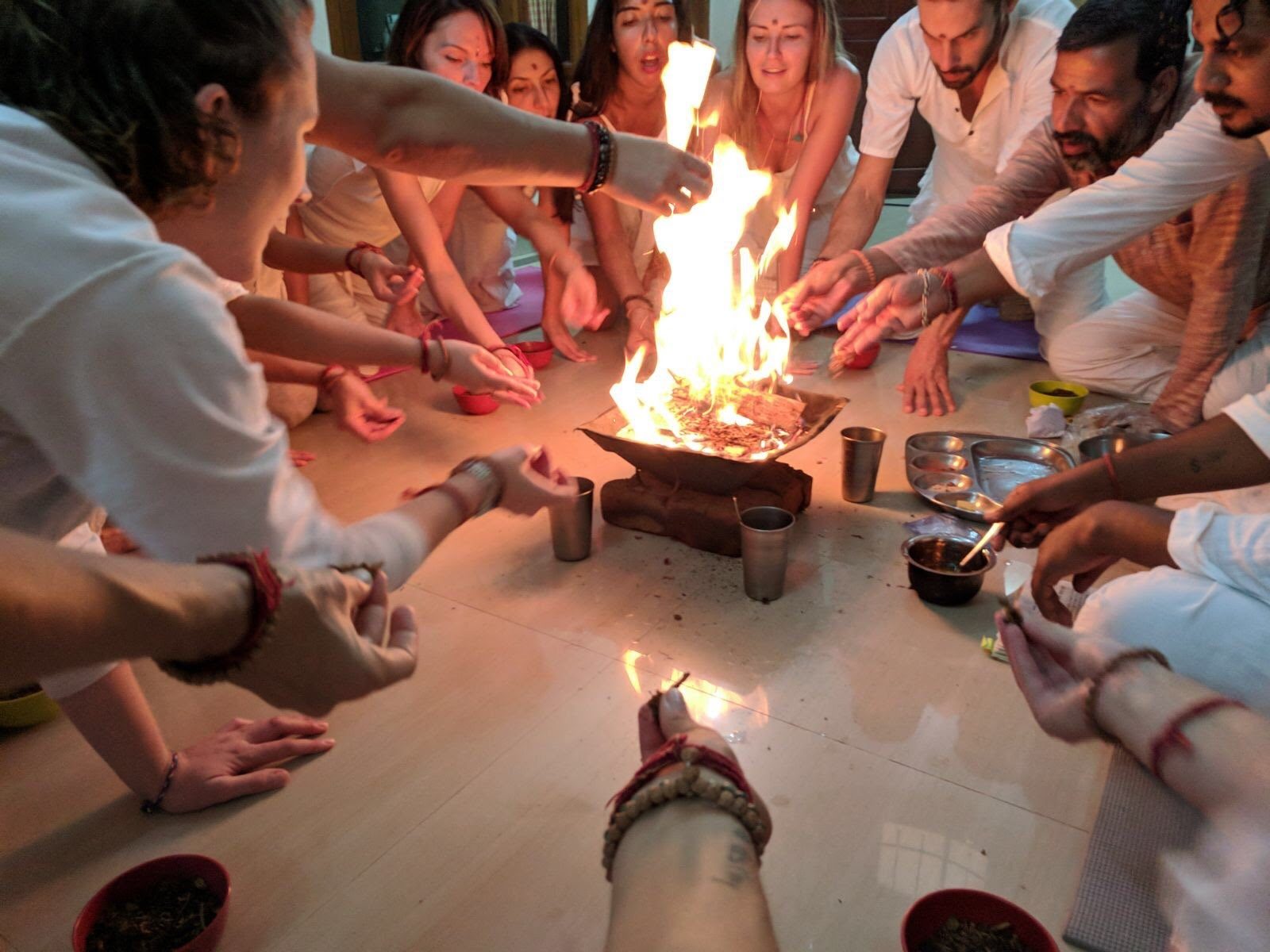The program begins and ends the same, with a fire ceremony. We all wear white, and take turns tossing in offerings of fresh herbs to purge our negativity while our leader, Sachin, feeds the flames with ghee (clarified butter) and balsa wood. Our wrists are tied with red and yellow threaded bands, worn by most on the right. As a married woman, I will wear mine throughout the month, as a symbol of my devotion to the program.
Two Sanskrit mantras are repeated seven times during the fire ceremony. Although a bit more familiar to me now, I am uneasy with the Sanskrit chanting, all gibberish to me. Perhaps a little more research on my behalf, some indoctrination, or simple interpretation would have been helpful?
I survey the group, comprised primarily of millenials from around the globe. While I know I have not come to make friends, I just don’t feel as if I fit in. There is one older couple from Vancouver I immediately vow to befriend. The others could be my kids, and certainly they don’t relish hanging out with “Mom”.
As the days pass and we chant “OM” countless times (a minimum of three times before and after each session of pranayama, meditation and yoga, and again preceding every meal), I find myself wondering how many of the verses are religious in content, and if the ideas contradict my Jewish beliefs? It’s embarrassing, but I have little knowledge of eastern philosophy, and only minimal understanding of Judaism, Christianity and Islam. What have I gotten myself into?
Mantras are vibrational “formulas” that are recited silently, spoken or sung outwardly, supposedly delivering specific results when repeated a certain number of times. These specific results could include healing, fertility, the creation of abundance, etc. Mantras are used to open the heart and mind and to aid in accessing and entering into a state of greater awareness.
And so it is, I am here to become more mindful, and am willing to explore these new ideas to gain self awareness and acceptance. I embrace the rituals (what choice do I have?) and navigate the rigorous curriculum. Here is an excerpt from my notes:
Day 3 – Thursday
Although I didn’t sleep well, I felt energized with the day’s program.
6 am Kriya- We were shown how to do netti pot.
7:30-9:00 Ashtanga- slow and methodical, focus on form. Shara’s voice so soft and soothing. Sachin a little difficult to understand, but very good.
9:30 – 10:30 Breakfast – Food is becoming less diverse. Bulgar wheat and porridge, leading up to a “cleanse” none of us was aware we’d be doing.
10:30-11:45 Mantra – Professor so hard to understand. I really want to learn to meditate, but without the basic understanding of what I am chanting, or why, it’s difficult. I find myself drifting only because I’m falling asleep, so tired. The sequences seem so long, will I get through these classes? Now it’s fine, since I’m so sleepy.
11:45- 13:00 Kriya lecture- We’re told we’ll be doing several “purges”, starting tomorrow with drinking tons of hot water and rock salt, until our poo is clear as water. Next, vomiting. Also clearing nose by threading a thin cord through one nostril.
1-2 Lunch
3:15-4:15 Philosophy – Sanjeev’s aura was so amazing, right from the start. His demeanor, the way he asked questions and engaged with us so meaningful. We all loved him, look forward to more.
4:30-6 Asana – Yoga poses dissected.
6:15-7:15 Meditation- again, long sequences, chants. Shaking/dancing was fun. I shall sleep tonight!
7:15 Dinner
The cleansing rituals scare me. The food feels like it’ll make me fat. Hopefully the yoga will offset the calories and the cleansing will detox me and offset the carbs.

